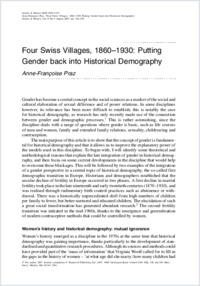Four Swiss villages, 1860-1930 : putting gender back into historical demography
- Praz, Anne-Françoise Université de Fribourg
-
2007
Published in:
- Gender & History. - 2007, vol. 19, no. 2, p. 242-259
Démographie historique
Études sur le genre
Transition démographique
Fécondité humaine
Religion
Régulation des naissances
Morale religieuse
Église catholique
Protestantisme
Rôle selon le sexe
19e siècle (2e moitié)-20e siècle (début)
Fribourg (Suisse, canton)
Vaud (Suisse)
Chevroux (Suisse, VD)
Broc (Suisse, FR)
Delley-Portalban (Suisse, FR)
Chavornay (Suisse, VD)
études sur le genre
régulation des naissances
gender studies
birth control
English
Gender has become a central concept in the social sciences as a marker of the social and cultural elaboration of sexual difference and of power relations. In some disciplines however, its relevance has been more difficult to establish; this is notably the case for historical demography, as research has only recently made use of the connection between gender and demographic processes.This is rather astonishing, since the discipline deals with a range of questions where gender is basic, such as life courses of men and women, family and extended family relations, sexuality, childrearing and contraception. The main purpose of this article is to show that the concept of gender is fundamental for historical demography and that it allows us to improve the explanatory power of the models used in this discipline. To begin with, I will identify some theoretical and methodological reasons that explain the late integration of gender in historical demography, and then focus on some current developments in the discipline that would help to overcome these blockages. This will be followed by two examples of the integration of a gender perspective in a central topic of historical demography, the so-called first demographic transition in Europe. Historians and demographers established that the secular decline of fertility in Europe occurred in two phases. A first decline in marital fertility took place in the late nineteenth and early twentieth centuries (1870–1930), and was realised through rudimentary birth control practices such as abstinence or withdrawal. There was a historically unprecedented shift from high numbers of children per family to fewer, but better nurtured and educated children. The elucidation of such a great social transformation has generated abundant research.2 The second fertility transition was initiated in the mid-1960s, thanks to the emergence and generalisation of modern contraceptive methods that could be controlled by women.
- Faculty
- Faculté des lettres et des sciences humaines
- Department
- Département d'histoire contemporaine
- Language
-
- English
- Classification
- Social sciences
- License
-
License undefined
- Identifiers
-
- RERO DOC 31753
- RERO R004707297
- DOI 10.1111/j.1468-0424.2007.00474.x
- Persistent URL
- https://folia.unifr.ch/unifr/documents/302726
Statistics
Document views: 236
File downloads:
- Texte intégral: 203
